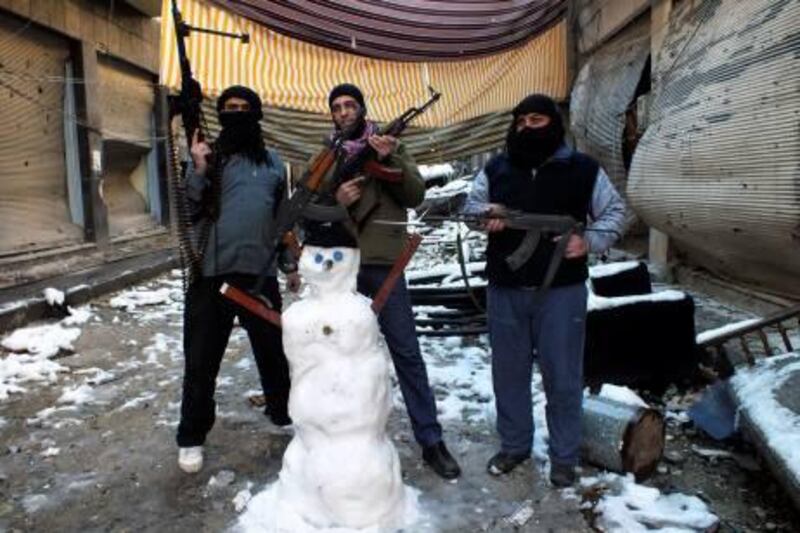DAMASCUS // The snow that covered Damascus in a blanket of white last week provided yet another reminder, in case any was needed, of how beautiful the city can be.
For a moment, stretched out beneath the low peak of Qassiun mountain, the Syrian capital was as perfect as the image on a postcard.
And there was silence – no explosions, no shooting, not even the usually inescapable noise of traffic.
Yet for all it did to highlight the Syrian capital's fading splendour, the mantle of snow also served to underscore the dire conditions in which many residents are living.
The storm-force winds, torrential rain and snow that blew down from the Lebanon mountains resulted in flooded homes, overflowing sewers and sub-zero temperatures.
It was misery heaped upon misery for thousands of refugees from hard-hit neighbourhoods around the Syrian capital.
Fleeing the fighting, many families occupy unfinished buildings in nearby districts, living in the skeletons of bare apartment blocks without windows or doors, offering little protection from the elements.
A luckier few are able to camp in schools or squat in empty offices and shops. The most fortunate of all have friends or relatives they can stay with or the money to rent flats in safer parts of the city.
But even in the finished and furnished homes of the middle class, the weather added to the woes of families already struggling to cope as their country slowly crumbles around them.
Syrian building standards are hardly exemplary and the already inadequate infrastructure is fast decaying.
My flat, which I rent from a dentist, is draughty and damp. Mould grows with vigorous enthusiasm from interior walls during the winter months and, during heavy rainfall, water streams from one of the electrical sockets and through gaps in poorly fitted windows and doors.
Of course, the refugees dream of only having to deal with such simple, familiar problems in the chilly comfort of their own homes.
When the storms were at their height last week, some friends asked if they and their two young sons could come and stay in my apartment for a while.
Their electricity had been out for 24 hours – everyone's had, as always happens during heavy rain in this part of town – they had no heating and, more pressingly, the drains had backed up, flooding all basement apartments, including theirs, with filthy, black sewage water.
It was 2am when the drains burst and they had rushed upstairs to their neighbours, who immediately welcomed them in, despite the fact they already had war refugees staying in the living room of their small, second-storey flat.
"It's amazing how helpful people are," my friend said. "No one asks for anything, they just said, 'come in quickly, bring the boys'."
With the country mired in a seemingly interminable war and, in many ways, becoming increasingly divided, local communities do, nevertheless, pull together to cope with the hardships.
"It's a good job we help each other in Syria, otherwise things would be much worse," my friend said. "I feel proud of how people cope with so much difficulty."
Camping on the floor in my kitchen – the other rooms were soaking wet or too cold – their youngest son, just a few months old, slept quietly, wrapped in a blanket, while his brother, not yet of school age, played with a battery-powered radio. Their mother cooked lunch and their father brewed coffee on the gas heater we huddled around.
War, and the addition recently of colder than normal weather, has reduced life to its basics.
Physical safety is always the major priority, followed by shelter, warmth, food and clean drinking water.
Most people don't have the luxury of too many other problems.
However, with the snow spread out across the city on Thursday morning, for a moment those problems were forgotten. People played and laughed.
The southern suburbs were covered by a pristine layer of white, painting over the mud and rubbish dumped on a patch of waste ground at the edge of town where children once played football, before a militia set up a checkpoint nearby.
A young couple walked over from the tree line, a shy distance apart from one another, each wrapped in a scarf, hat and warm jacket. Theirs were the only footprints tracked through the snow.
In the distance, there was a burst of machine-gun fire and then silence again, a reminder that the conflict hadn't gone away. But, for a while, it had subsided. An hour later, in bright sunshine, the air still cold, the same patch of ground was pell-mell with children, teenagers and adults building snowmen and having snowball fights.
A woman in a smart, brown coat and white hijab, with a good left throwing arm, splattered her husband and then their sons with accurately aimed snowballs, and then ran off laughing before they could retaliate. She scooped up more snow and hit them again.
There were other moments of reprieve from the war and the harshness of the weather.
Abu Mohesin wandered out on to his roof top that snowy day and looked across the city towards the mountains.
He was really up on his roof to unfreeze a jammed water tank. He knew that when the snow started to thaw, his house would likely flood again and the ubiquitous damp-rot would worsen. The sewers would also flood anew and the roads would be clogged with muddy sludge.
But for five minutes, as people threw snowballs at one another down below with a rare happiness, he sat and was content.
"Enjoy these times," he said. "I know there are problems coming our way but look at that view. It's beautiful. I love this place."
psands@thenational.ae





